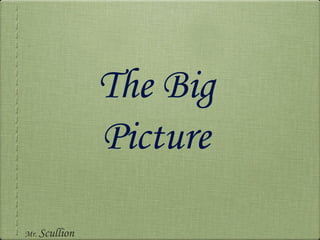The Big Picture
- 1. Mr. Scullion The Big Picture
- 2. Why is it important to study the past? Caution Some of histories lessons teach caution. They tell of people who made decisions that harmed others. An example of this would be of the Rise of Hitler in WW 2.
- 10. Why is it important to study the past? Inspiration Many other stories are inspiring. They tell of people who struggled against great odds and succeeded. An example of this would be the Spartans at Thermopylae
- 11. Historical Thinking As you learn about the past, you can develop historical thinking. Historical thinking will help you to understand the past and to think critically about issues in the present and future.
- 12. Historical Thinking Historical Research Means searching out a variety of sources that will help you answer a historical question or learn more about a historical period or event.
- 13. Historical Thinking Historical Comprehension Means understanding historical sources. This involves asking many questions. Who created the source? Why was it created? How accurate is it likely to be? Reading and interpreting historical maps, graphs, and data is another part of this skill. It is important to put aside your own ideas about the past in order to understand how the people you are studying viewed their situation.
- 14. Historical Thinking Historical Imagination QuickTimeâĒ and a YUV420 codec decompressor are needed to see this picture. Means the ability to put yourself in the middle of a historical event, to imagine different courses of action, and to evaluate the potential consequences of those different actions.
- 15. Historical Thinking Historical Analysis and Interpretation Means thinking critically about what you study. Comparing and contrasting, determining the difference between fact and opinion, analyzing cause and effect, and evaluating differing sources are all parts of this skill.
- 16. Historical Thinking Chronological Thinking Involves understanding how events unfold over time. Chronological thinking helps you understand cause and effect. Creating timelines is a good way to develop chronological thinking.















